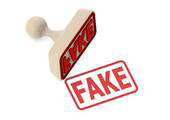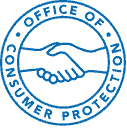Fake Check Scams
| Are you a grand prize winner? Have you won a foreign lottery? Did you receive a check from an organization with instructions to deposit the money in your account and then transfer a portion of money for “processing fees” or taxes? If this sounds familiar, you may have encountered a fake check scam, which is unfortunately, becoming more common each year. This scam is one of the most common in the United States and has resulted in innocent victims losing thousands of dollars. It is crucial to be aware of the various versions of this scam, but they all end the same way. There was never a legitimate prize or service in the first place. The deposited check will eventually be determined as fake by the bank, and any money sent for so-called "processing fees" or other reason will be gone. In the end, you will be responsible for repaying the bank the full cost of the counterfeit check. |
 |
Protecting yourself from fake check scams is all about using your common sense. Whether it's receiving an overpayment for something you sold or being told you won a foreign lottery or prize, there are some warning signs that can help you spot a scam.
- Ask yourself if you even applied for the contest or lottery. If you didn't, it's highly unlikely that you actually won. Don't let the excitement of a prize cloud your judgment. This is usually the first red flag of a scam.
- Be cautious if someone asks you to send money by wire transfer, MoneyGram, or person-to-person mobile payment apps like Cash App, PayPal, Venmo, or Zelle to claim your prize. These payment methods offer little protection if something goes wrong, making them a favorite choice for scam artists. If someone demands that you wire or transfer money upfront before receiving a prize, it's almost certainly a scam. Only send money to people or organizations you know and trust.
- If someone buys merchandise from you but overpays, be wary. Instead of depositing the check and sending the buyer money for the difference, return the check to them and request the correct amount. Scammers may use this tactic to trick you into sending them money or goods.
If you find yourself in any of these situations, contact the Office of Consumer Protection for assistance. For more information see the FTC's page on How to Spot, Avoid and Report Fake Check Scams.
When you deposit a check into your bank account, it's essential to be aware of some important rules. Until the bank confirms that the check has cleared, you are responsible for the checks you deposit. Most banks make a portion of the money available to you promptly. Usually, they must give you the first $225 (or sometimes even $100) on the next business day after you deposit the check.
The remaining amount of the check will become available to you within 2 to 5 days after the deposit. This fast access to funds can be helpful, but there's a downside to it. It might take the bank several weeks to determine if the check is genuine or fake.
If it turns out that the check is fraudulent and money has already been withdrawn from your account, you will be responsible for repaying that money to the bank.
While you might get some money from the deposited check quickly, it is important to stay cautious and patient until the bank confirms that the check is legitimate. Always be vigilant about the checks you deposit and be prepared to repay the bank if any issues arise. This way, you can protect yourself from potential scams and financial losses.
|
||||||||||||||
